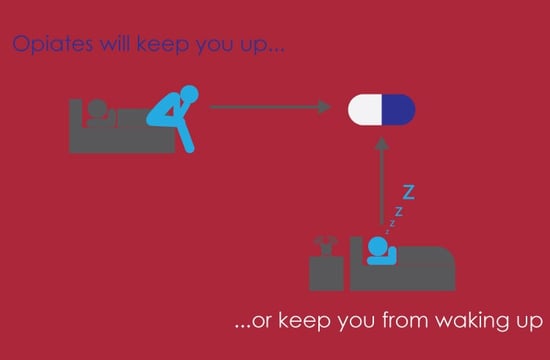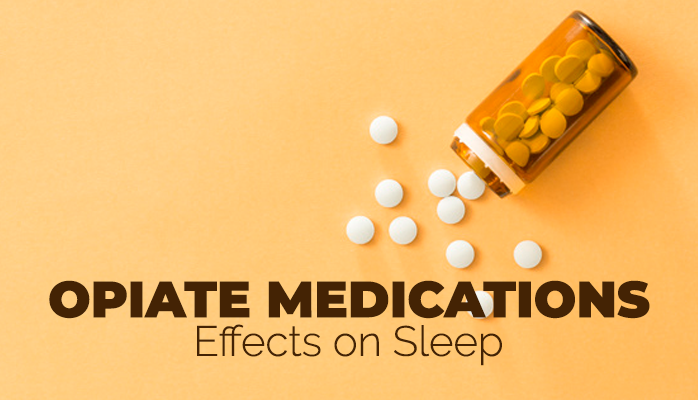Do Opiate Medications Cause Sleep Problems?
Opiate use is at an all-time high in the US. It is a serious epidemic in many cities, especially in Anchorage. It goes without saying that opiate dependency can have dramatic effects on someone’s psychological and physical health. In light of this, lifestyle problems and periphery effects of opiate addiction or taking opiate medications, such as sleep health, go virtually unacknowledged.
The reality is that chronic use of opiate medications can considerably disrupt normal sleep cycles. Unfortunately, this is a revolving door because sleep problems can exacerbate many of the side effects of chronic opiate use, such as:
- Mood problems
- Impulsivity
- Cognitive disruptions
- Physical underperformance
Let’s look at how opiate medications affect sleep in more detail.
Relationship Between Opiate Side Effects and Sleep
Opiates are strange in that they have properties that both make us feel tired but also promote wakefulness [1]. The result is the frustrating feeling of wanting to sleep, being ready to sleep, but being unable to actually get a good sleep.

Hence, chronic use of opiates usually are accompanied by the following symptoms [3]:
- Insomnia:
- Waking up feeling that sleep wasn’t restful
- Problems staying asleep at night (characteristic of insomnia)
- Problems falling asleep (characteristic of insomnia)
- Daytime sleepiness
- Highly vivid dreams that disrupt sleep
- General tiredness
For example, researchers at St. George’s Hospital Medical School found that opiate users [4] were:
- More than five times as likely to report difficulty falling asleep
- More than nine times as likely to report not sleeping well
It’s unclear how short-term opiate medication use may affect sleep, as well as the extent to which sleep-related side effects are a risk factor for perpetuating opiate use.
How Opiate Medications Disrupt Sleep
There are four stages to sleep. The most well-known is REM sleep (rapid eye movement), the fourth stage. The average person spends about 20% of total sleep in this stage. It is also where:
- Memories are consolidated
- Dreams occur
- Muscles become immobilized
The other important sleep stage is NREM (non-REM) stage three, where deep sleep occurs.
Opiates disrupt both of these stages of sleep because of their complex interaction with a chemical called adenosine – an interaction that is dose- and receptor-dependent [3]. Hence, even if you take opiates and get a “full night's rest,” you may still feel physically fatigued in the morning.
Relationship Between Opiate Medications and Sleep Apnea
Prolonged use of opiates may contribute to sleep apnea. Sleep apnea is a medical condition where one breathes shallowly or experiences pauses in breathing, leading to a person waking up to instigate normal breathing. This may happen many times during the night, essentially crippling one’s ability for restful sleep.
Opiates depress respiration by slowing down breathing rate or reducing the fullness of breaths taken – the result is less oxygen in the blood. For people who already have a variant of sleep apnea, or are at risk for developing it (i.e., people with obesity or diabetes), taking opiate medications can:
- Increase the risk of developing sleep apnea
- Make existing sleep apnea more severe
Final Thought: What to do If You’re On Opiate Medications
For many people, taking opiate medications is necessary. To see how opiate medications are affecting your ability to get restful sleep, we highly suggest that consult with a sleep specialist or get a sleep study. Please click the orange button below to take a free online sleep test and talk with one of our sleep health specialists.
References
[1] 6. De Andrés I, Caballero A. Chronic morphine administration in cats: Effects on sleep and EEG. Pharmacol Biochem Behav. 1989;32:519–26. [PubMed]
[2] Jason T Moore, Max B Kelz. Opiates, Sleep, and Pain: The Adenosinergic Link. Anesthesiology. 2009 Dec; 111(6): 1175-1176. [NCBI]
[3] Porkka-Heiskanen T, Strecker RE, Thakkar M, Bjorkum AA, Greene RW, McCarley RW. Adenosine: A mediator of the sleep-inducing effects of prolonged wakefulness. Science. 1997;276:1265–8. [PMC free article] [PubMed]
[4] James Elander, Sally Porter & Sally Hodson (1994) What role for general practitioners in the care of opiate Users?, Addiction Research, 1:4, 309-322, DO


